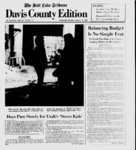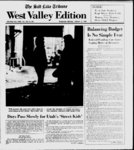Pages | 11 of 97
Salt Lake Tribune | 1986-01-22 | Page 11
| Type | issue |
| Date | 1986-01-22 |
| Paper | Salt Lake Tribune |
| Language | eng |
| City | Salt Lake City |
| County | Salt Lake |
| Rights | In Copyright (InC) |
| Rights Holder | The Salt Lake Tribune, Salt Lake City, Utah |
| Publisher | Digitized by J. Willard Marriott Library, University of Utah |
| ARK | ark:/87278/s6m6758g |
| Reference URL | https://newspapers.lib.utah.edu/ark:/87278/s6m6758g |
Page Metadata
| Type | page |
| Date | 1986-01-22 |
| Paper | Salt Lake Tribune |
| Language | eng |
| City | Salt Lake City |
| County | Salt Lake |
| Page | 11 |
| Reference URL | https://newspapers.lib.utah.edu/ark:/87278/s6m6758g/29249613 |



































































































